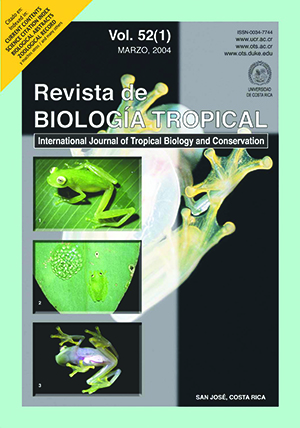Abstract
A new species of Dipsas is described from the Pakaraima Mountains of Guyana. The new species is characterised by 15 dorsal scale rows with the middorsal row slightly enlarged, four pairs of chinshields with the first pair elongate, elongate loreal entering orbit, one preocular, six upper labials, and head narrow anteriorly, increasing in width posteriorly. It could not be determined to which of Peters’ (1960) species groups the new species belongs. The new species is known only from 1490 m elevation on Mount Ayanganna, a tepui in the Guiana Shield, where it was found in high-tepui low-canopy habitat, in bromeliads or branches. This is the first record of Dipsas as a member of the Guiana Shield high-tepui herpetofauna.References
Chippaux, J.–P. 1986. Les serpents de la Guyane française. ORSTOM Faune Tropical #27, Paris. 165 p.
Donnelly, M.A. & C.W. Myers. 1991. Herpetological results of the 1990 Venezuelan expedition to the summit of Cerro Guaiquinima, with new tepui reptiles. Amer. Mus. Novit. 3017: 1–54.
Dowling, H.G. 1951. A proposed method of expressing scale reductions in snakes. Copeia 1951(2):
–134.
Dowling, H.G. & J.M. Savage. 1960. A guide to the snake hemipenis: a survey of basic structure and systemat-
ic characteristics. Zoologica 45: 17–28.
Fanshawe, D.B. 1952. The vegetation of British Guiana: a preliminary review. Inst. Paper #29, Imperial
Forestry Inst., Oxford. 96 p.
Gorzula, S. & J. Ayarzagüena. “1995” [1996]. Dos nuevas especies del genero Thamnodynastes (Serpentes:
Colubridae) de los tepuyes de la Guayana Venezolana. Publ. Asoc. Amigos de Doñana 6: 1–17.
Gorzula, S. & J.C. Señaris. “1998” [1999]. Contribution to the herpetofauna of the Venezuelan Guayana I. A data base. Scientia Guaianae #8, Caracas. xviii + 270 + 32 p.
Huber, O., G. Gharbarran & V. Funk. 1995. Vegetation map of Guyana. Centre for the Study of Biological Diversity, Univ. of Guyana, Georgetown.
Kofron, C.P. 1982. A review of the Mexican snail-eating snakes, Dipsas brevifacies and Dipsas gaigae. J. Herpetol. 16: 270–286.
Kornacker, P.M. 1999. Checklist and key to the snakes of Venezuela. Pako-Verlag, Rheinbach. 269 p.
MacCulloch, R.D. & A. Lathrop. 2001. A new species of Arthrosaura (Sauria: Teiidae) from the highlands of
Guyana. Carib. J. Sci. 37: 174–181.
MacCulloch, R.D. & A. Lathrop. 2002. Exceptional diversity of Stefania (Anura: Hylidae) on Mount Ayanganna, Guyana: three new species and new distribution records. Herpetologica 58: 327–346.
Maguire, B. 1970. On the flora of the Guyana highland.Biotropica 2: 85-100.
Myers, C.W. 1997. Preliminary remarks on the summit herpetofauna of Auyantepui, eastern Venezuela. Acta
Terramaris 10: 1–8.
Myers, C.W. & M.A. Donnelly. 1996. A new herpetofauna from Cerro Yavi, Venezuela: first results of the Robert G. Goelet American Museum – Terramar expedition to the northwest tepuis. Amer. Mus. Novit. 3172: 1–56.
Myers, C.W. & M.A. Donnelly. 1997. A tepui herpetofauna on a granitic mountain (Tamacuari) in the border land between Venezuela and Brazil: report from the Phipps Tapirapeco expedition. Amer. Mus. Novit. 3213: 1–71.
Myers, C.W. & M.A. Donnelly. 2001. Herpetofauna of the Yutaje-Corocoro massif, Venezuela: second report
from the Robert G. Goelet American Museum Terramar expedition to the northwestern tepuis. Bull. Amer. Mus. Nat. Hist. 261: 1–85.
Peters, J.A. 1956. An analysis of variation in a South American snake, Catesby’s snail-sucker (Dipsas catesbyi Sentzen). Amer. Mus. Novit. 1783: 1-41.
Peters, J.A. 1960. The snakes of the subfamily Dipsadinae. Misc. Pub. Mus. Zool. Univ. Michigan 114: 1–224.
Peters, J.A. & B. Orejas-Miranda. 1970. Catalogue of the neotropical squamata. Part I. Snakes. U.S. Nat. Mus.
Bull. 297: 1–347.
Reynolds, R.P. & M.S. Foster. 1992. Four new species of frogs and one new species of snake from the Chapare
region of Bolivia, with notes on other species. Herpetol. Monogr. 6: 83–104.
Roze, J.A. 1958a. Los reptiles del Auyantepui, Venezuela, basandose en las colecciones de las
expediciónes de Phelps-Tate, del American Museum of Natural History, 1937-1938, y de la Universidad Central de Venezuela, 1956. Acta Biol. Venez. 2: 243–270.
Roze, J.A. 1958b. Los reptiles de Chimanta tepui (Estado Bolivar) Venezuela, colectados por la expedición
botanica del Chicago Natural History Museum. Acta Biol. Venez. 2: 299–314.
Roze, J.A. 1966. La taxonomía y zoogeografía de los ofidios de Venezuela. Univ. Central de Venezuela,
Caracas. 362 p.
Savage, J.M. 2002. The Amphibians and Retiles of Costa Rica: a herpetofauna between two continents, between two seas. University of Chicago. pp. 596- 599.
Starace, F. 1998. Guide des serpents et amphisbènes de Guyane. Ibis Rouge, Paris. 449 p.
##plugins.facebook.comentarios##

This work is licensed under a Creative Commons Attribution 4.0 International License.
Copyright (c) 2004 Revista de Biología Tropical


